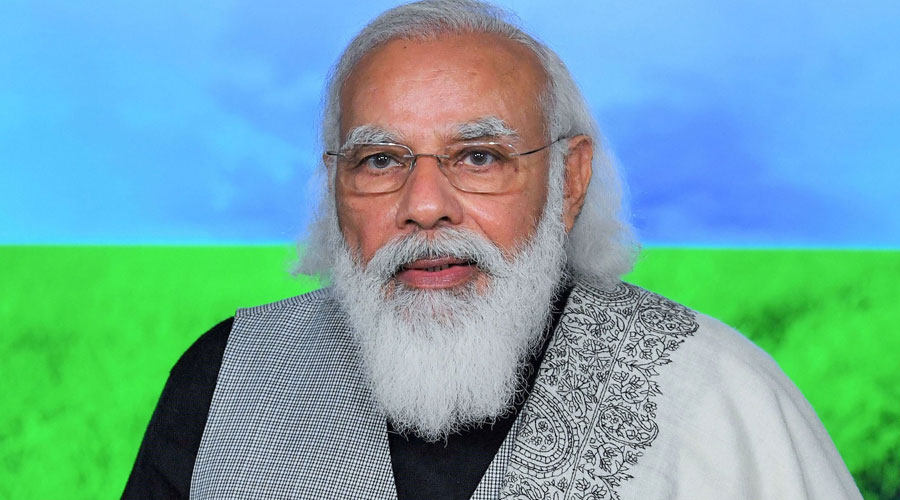Prime Minister Narendra Modi has intervened to mediate in a century-old dispute between two Kerala Christian denominations, strengthening suspicion that the BJP is reviving its plan to lure the crucial minority vote bank in the state that has consistently rejected the party.
A property dispute between two powerful churches has been dragged to the Prime Minister’s Office, that too by a governor who is supposed to be apolitical. Mizoram governor P. Sreedharan Pillai, who is the immediate past president of the BJP in Kerala, was instrumental in mobilising bishops to meet Modi over three days.
While representatives of the Malankara Orthodox Syrian Church met the Prime Minister in Delhi on Monday, bishops from the rival Jacobite Syrian Christian Church did so on Tuesday. Catholic bishops will meet Modi on Wednesday.
Rev. Sleeba Paul, trustee of the priests of the Jacobite Church, told The Telegraph on Tuesday that it was
Pillai who had taken the initiative for the discussions with Modi.
“Although we are more in number, our churches are being taken over, leaving us with no place to pray or even bury our dead,” Paul said, referring to a 2017 Supreme Court judgment that ordered over 1,064 of the 1,700 churches to be given to the rival Orthodox church.
So far, 52 churches have been transferred.
The dispute dates back more than a century when the Malankara church split in 1912 into Jacobite and Orthodox groups. While they were brought together in 1959, the unity lasted only till 1972.
This led to one of the longest-standing disputes between two powerful church groups. While the Jacobites are numerically stronger, the Orthodox church comprises some of the elites of Kerala society.
Scholar and political commentator M.N. Karassery slammed Pillai for misusing his gubernatorial office by acting as an intermediary between the Prime Minister and the Church.
“He shouldn’t have taken to such mediation since he occupies a major constitutional position. Also, it’s not the Prime Minister’s job to intervene in what is strictly a property dispute between two churches. All of this means that this exercise is part of the larger RSS agenda to lure Kerala’s Christians,” Karassery told this newspaper on Tuesday.
The BJP has been struggling to get a toehold in Kerala, a state where Christians form about 20 per cent and Muslims about 30 per cent of the 3.5 crore population.
“The Prime Minister is trying to make it look like an international issue to portray himself as the protector of the Christian faith. This is sheer mockery of democracy,” Karassery said.
He questioned the rationale of seeking the Prime Minister’s help even if the churches wanted an out-of-court settlement.
“They should have gone to the court and not the Prime Minister. This means those who organised this are interfering in the affairs of the judiciary for political gains,” Karassery alleged.
Reformists who have been fighting to implement a bill that would transfer much of the powers from the bishops to the laity also came out against Modi’s intervention.
Felix J Pulludan, chairman of the Joint Christian Council, accused the BJP of trying to lure upper caste Christians.
“Since the BJP is an upper caste party, many savarna (upper caste) Christians have often stood with the savarna politics of the RSS and the BJP. The BJP is banking heavily on that caste feeling among Christians to lure them,” Pulludan said.
He called on the churches to join hands and get the state government to pass the Kerala Properties and Institutions Trust Bill, 2019, instead of going to the Prime Minister to solve a property dispute.
“The Church Bill provides effective solutions to end such property disputes by handing much of the power to the laity. But the bishops don’t want to lose control of money and property,” Pulludan said.
The bishops of each diocese enjoy the rights on church properties. “Disputes will get sorted out once the power shifts to the laity,” he said.
While the draft bill mooted by the Kerala Law Reforms Commission headed by former Supreme Court judge Justice K.T. Thomas seeks to make things more transparent, it has not gone down well with the clergy who suspect it is a state government plan to take over churches.
The Left government headed by chief minister Pinarayi Vijayan had put the bill on the back burner as it did not want to take on the powerful clergy.











